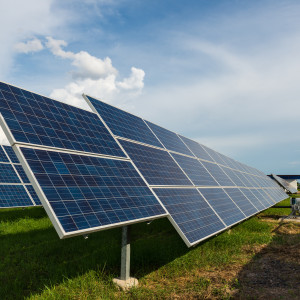It was drizzling slightly in Washington on Tuesday, but that didn’t stop solar workers from showing up outside the offices of the U.S. International Trade Commission. When the ITC looks into placing tariffs on products from overseas, it is almost always trying to protect domestic producers. A current case involving solar energy shows that tariffs aren’t always the most effective means of achieving that goal. As the ITC weighed the potential costs and benefits of the proposed solar cell tariff, solar industry workers and representatives, along with other attendees, filled three overflow rooms and ITC staff said informally that the crowd was the largest they had ever seen.
At the center of the debate is a proposed solar cell tariff pushed for by Suniva and SolarWold, two struggling solar energy companies. In late May, the ITC began investigating allegations that Chinese companies flooded the market with cheap fuel cells in an attempt to drive out competition and informed the World Trade Organization that it was considering enacting emergency tariffs on imported solar cells. Suniva has since filed for bankruptcy and SolarWorld has warned that it is in serious financial straits and struggling to compete with unfair foreign competition.
It was an argument that got little sympathy. Opposition to the proposed tariff is widespread. Since the complaint was filed, state lawmakers, industry groups, and other solar companies have spoken out against the proposed solar cell tariff and many were represented at the hearing. Opponents of the proposed solar cell tariff say that it threatens 88,000 jobs by raising the price of imported solar panels and blame poor business practices on the part of Suniva and Solar world for their economic woes.
“SolarWorld and Suniva failed to fully qualify their product with major purchasers,” said the Solar Energy Industries Association, in a brief submitted to the ITC. “Suniva and SolarWorld both experienced complaints from a litany of dissatisfied customers over late shipments, damaged products and general product unreliability.”
The SEIA is an industry group representing around 800 member companies in the solar industry. It was joined by a coalition of conservative groups, including the Heritage Foundation and the American Legislative Exchange Council (ALEC), who argued that the solar cell tariff would hurt competitiveness in the solar industry and the economy at large.
In addition, a Georgia utility commissioner, and state lawmakers from Maryland, Minnesota, North Carolina, and Virginia spoke at the hearing, urging the ITC not to harm one of the fastest growing industries in the country by saddling it with new tariffs.
“This industry is an incredible job creator with currently over 7,000 well-paying jobs in North Carolina,” said Jason Saine, a North Carolina Republican state representative, who noted that solar growth had helped his state attract $9 billion in investment over the past 10 years. “Imposing tariffs on imported modules is not the way to go about saving solar manufacturing. It is about providing a government handout to two companies.”
Saine’s concerns were shared by local representatives from outside of the Sun Belt, who described the overall health of the industry and said that free trade helped, rather than hindered American companies.
“The solar industry is important in my state. I see a bright future in this industry,” said Minnesota State Senate Majority Leader Paul Gazelka, a Republican, who testified on the importance of maintaining a healthy trade relationship with Canada.
Minnesota has seen rapid growth in its solar industry. In the last year, its solar energy capacity jumped 80 percent, the result of a state incentive program and declining equipment costs. Jobs in solar energy are also increasing at a rate much faster than the overall state economy. Suniva and SolarWorld claim that at least 114,800 new American jobs would be created if the petition for a tariff were granted.
Prior to the hearing, a bipartisan group of 16 U.S. senators representing states “that have a growing solar industry” also submitted a letter to the ITC, urging the commission to consider the negative effects the tariff would have on domestic solar energy companies. In the letter, the senators cited research that suggested the tariff would cut the demand for solar projects in half over five years and would halt industry growth. Fifty-three members of Congress signed a parallel letter from the House.
“Solar companies in our states believe the requested trade protection would double the price of solar panels,” the letter said. “Increasing costs will stop solar growth dead in its tracks, threatening tens of thousands of American workers in the solar industry and jeopardizing billions of dollars in investment in communities across the country.”
Afterwards, many of the opposition groups were hopeful that their presence at the hearing had persuaded the ITC that a tariff was not in the best interests of the solar industry or the U.S. economy.
“What was clear today is that two foreign-owned companies seeking U.S. government subsidies who disingenuously claim to represent solar manufacturing were on one side and the broader unified solar industry united on the other,” said Abigail Ross Hopper, SEIA’s president and CEO after the hearing. “We hope the ITC sees the petition for what it is, and doesn’t put the interests of two companies that made bad business decisions above those of American workers.”
The ITC will issue its final decision by September 22.

